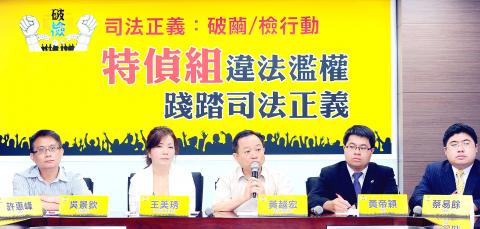|
SID sued over probe
into Wang
‘HIRED THUGS’: One lawyer said that the SID has
become a political tool and ineffective, while others called for the division to
be abolished
By Chris Wang / Staff reporter

Lawyers and academics hold a
press conference in Taipei yesterday after filing a lawsuit against
Prosecutor-General Huang Shih-ming and the Supreme Prosecutors’ Office Special
Investigation Division for alleged unlawful handling of an influence peddling
investigation.
Photo: Chang Chia-ming, Taipei Times
Legal experts yesterday filed a lawsuit
against the Supreme Prosecutors’ Office Special Investigation Division (SID) and
Prosecutor-General Huang Shih-ming (黃世銘) for allegedly following illegal
procedures in their investigation of alleged influence peddling involving
Legislative Speaker Wang Jin-pyng (王金平).
The SID and Huang have violated the Communication Security and Surveillance Act
(通訊保障及監察法), the Personal Information Protection Act (個人資料保護法) and the Civil
Servant Service Act (公務人員服務法), Huang Yueh-hung (黃越宏), the founder of the Law
Times newspaper, said before filing a lawsuit at the Taipei Prosecutors’ Office
yesterday morning.
The SID on Friday accused Wang, former minister of justice Tseng Yung-fu (曾勇夫)
and Taiwan High Prosecutors’ Office head prosecutor Chen Shou-huang (陳守煌) of
influence peddling for Democratic Progressive Party (DPP) Legislator Ker
Chien-ming (柯建銘), sparking widespread public discussion over politicians’
lobbying and what appeared to be an orchestrated political vendetta.
SID and Huang violated the law at least nine times, Huang and other lawyers told
a press conference yesterday.
Wiretapping Ker in a prove into allegations of embezzlement did not mean the
information the SID accidentally obtained during the surveillance could be used
in a different case regarding lobbying, nor could the division publish the full
text of the raw intelligence in a press release, Huang said.
The division’s referral of Tseng to the Control Yuan violated the Public
Functionaries Discipline Act (公務員懲戒法), he said.
Additionally, the division’s request for Wang’s telephone records and its
publication of base station locations for Wang’s phone calls violated the
Personal Information Protection Act, Huang said.
Since Prosecutor-General Huang Shih-ming said he reported the case to President
Ma Ying-jeou (馬英九) on Aug. 31, “it proved that Ma was aware of the SID’s abuse
of wiretapping, but has not done anything to stop the practice,” lawyer Huang
Di-ying (黃帝穎) said.
The development of the investigation showed that the SID has become hired thugs
for politicians to persecute their rivals, he said.
“I think it is time for the Legislative Yuan to think about abolishing the
division — after the new [legislative] session begins next week,” Huang Di-ying
said.
Wu Ching-chin (吳景欽), an associate professor of law at Aletheia University,
agreed with Huang’s recommendation, saying that the SID had pressed charges
against many former DPP government officials, but most of the cases were either
dropped or the defendants were found not guilty.
“With its poor efficiency and conviction rate, the division has now become only
a political tool and should be abolished,” Wu said.
In June, the Taiwan High Court found Ker not guilty of embezzlement in a case
stemming from 1997 when he was general manager of Formosa Telecom Investments
Co. Wang, Tseng and Chen allegedly sought to have prosecutors not appeal the
High Court verdict to the Supreme Court.
Additional reporting by staff writer
|
![]()
![]()
![]()